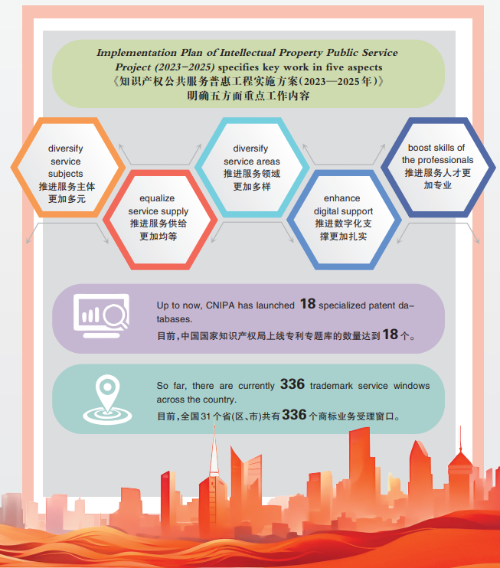Recently, the China National Intellectual Property Administration (CNIPA) has issued the Plan for the Implementation of Intellectual Property Public Service Project (2023-2025) (Implementation Plan). The Implementation Plan refines the overall requirements and tasks of the Fourteenth Five-Year Plan for Intellectual Property Public Services into specific implementation measures, and specifies key work in five aspects: diversifying service subjects, equalizing service supply, diversifying service areas, enhancing digital support and boosting skills of professionals.
Identifying key tasks, upgrading public IP services
With the implementation of the innovation-driven development strategy in recent years, various innovation subjects and modes have emerged in an accelerated manner in China, and higher expectations have been placed on public IP services. "The purpose of the Implementation Plan is to make policies public and fair, services public and accessible, and data public and open, to expand the coverage of public IP services, improve service efficiency and enhance service experiences, to allow those aspiring to innovate to access public services easily and conveniently, and allow those capable of innovating to enjoy the benefits of public service policies," said Wang Peizhang, Director General of the Public Service Department of CNIPA.
To diversify service subjects, the Implementation Plan calls for greater efforts to mobilize social forces to participate in the construction of the public IP service system, further expand the coverage of comprehensive public service agencies at the prefecture and city level, strengthen service teams, expand the service range of technology and innovation support centers, national IP information service centers of universities and other important outlets, and improve the quality and quantity of public service agencies.
To equalize service supply, the Implementation Plan calls for efforts to promote the construction of cities for the standardization of public IP services, further improve the standardization and facilitation levels of services, and accelerate the formation of synergistic effect featuring clear boundaries and coordinated development of public services and market-oriented services.
To diversify service areas, CNIPA has established a public service mechanism featuring supply-demand match and level-by-level services, striving to create the maximum benefits with limited service resources. The Implementation Plan calls for efforts to enhance public services for national strategic technological forces, new fields and new business, rural revitalization and other areas.
To enhance digital support, the Implementation Plan calls for efforts to further improve the digitalization level of public IP services, accelerate the building of national integrated public digital service platforms, intensify the supply of data resources, enrich the supply of public information service products, and support market-oriented data service agencies in growing stronger.
To boost skills of the professionals, the Implementation Plan calls for sustained efforts to strengthen the cultivation of public IP service talents, establish and improve a talent training and incentive mechanism, to lay a talent foundation for the inclusive development of public services.
Focusing on development needs, continuously improving services
In recent years, new technologies have emerged constantly and rapidly in new fields and new business, posing new requirements and expectations for patent and trademark examination. In terms of enhancing public service support for new fields and new business, the Implementation Plan proposes that efforts should be made to improve the mode of patent and trademark examination, and to take more extensive measures, such as conducting centralized examination of patents in new fields and new types of business.
"CNIPA has revised the examination standards to further strengthen patent protection; has optimized the examination mode to meet the diverse needs of innovation subjects, and further improve examination quality and efficiency in relevant fields; and has enhanced public services to increase data supply to key industries," said Wu Hongxiu, Deputy Director General of the Patent Examination Department of the Patent Office of CNIPA. To date, CNIPA has launched 18 specialized patent databases in support of technological innovation and IP protection in new fields and new business.
The Implementation Plan specifies the need to improve the convenience of public IP services. Handling of trademark-related matters by local offices has made convenient and efficient services accessible to applicants. "In terms of window layout, we have advanced service counters in an all-round way while providing preferential support and pursuing differential development; in terms of working mechanism, we have standardized services while improving working methods and enriching service content; and in terms of functioning, we have developed services while receiving applications and providing counseling," said Li Chang, Deputy Director General of the Trademark Office of CNIPA. There are currently 336 trademark service counters across the country, which play positive roles in optimizing business environment and serving local economic development.
The Implementation Plan also provides: Strengthen policy supply and effectively ensure the implementation of the project; strengthen organizational implementation, summarize and promote experience; strengthen classification guidance, improve the assessment and evaluation system, and ensure the smooth implementation of plans.
